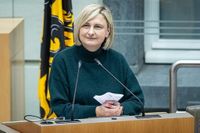The Flemish government has officially raised the oral language requirement for the Flemish civic integration programme. From now on, newcomers will have to reach B1 level in Dutch. This adjustment marks a significant shift from the previous target of A2, which is considered a basic level of language proficiency.
Hilde Crevits, the Flemish minister for Integration, announced the new requirement as part of the government’s coalition agreement, emphasizing that achieving B1 proficiency is essential for newcomers to engage in simple conversations. To aid in this transition, the government plans to introduce more opportunities for language practice.
Currently, most language courses are classroom-based, which poses challenges for full-time workers. Crevits has indicated a desire to make language learning more accessible by offering lessons at workplaces. Furthermore, parents who are not employed will have the opportunity to teach Dutch at their children’s schools. This initiative aims to involve various community stakeholders, including employers, local councils, schools, and sports clubs.
In addition to these changes, integration agencies will organize follow-up sessions to provide ongoing support for newcomers. Crevits believes that more guidance during the integration programme will lead to increased motivation and reduced dropout rates. She noted that raising the language requirement is expected to enhance job prospects for newcomers in Flanders.
Statistics reveal a clear correlation between language proficiency and employment rates. Of those who achieve A2 proficiency, an average of 50 percent find employment within three years. In contrast, the figure rises to 56 percent for individuals who reach B1 or higher. This data underscores the importance of language skills in securing stable employment and integrating into the local community.
Meanwhile, in Norway, a significant policy shift is underway in the realm of academic language requirements. The new research minister, Sigrun Aasland, has signaled the government’s intention to repeal a controversial law mandating that PhD students and postdoctoral researchers from abroad complete mandatory Norwegian language training. This law, which was introduced in August of last year, required non-Norwegian speakers to complete 15 study points of language training—approximately three months of study—during their contracts.
The backlash against this requirement was swift, with many scientists arguing that it posed substantial barriers to attracting international talent. Aasland announced the proposed reversal on March 21, 2025, as part of a broader strategy to enhance Norway’s research competitiveness and bolster national security through scientific advancement.
“Norway is a small country; we must collaborate more,” Aasland stated, highlighting the necessity of creating attractive conditions for international researchers. The government is also considering reviewing work-permit rules for scientists to facilitate their entry and retention in Norway.
Olga Lehmann, a psychology researcher from Colombia who has lived in Norway for over a decade, expressed gratitude for the government’s quick response to the concerns raised. “Norwegian academia needs to strive for balance between local and global needs,” she remarked, indicating optimism about the potential changes.
Nobel laureate Edvard Moser, who heads the Kavli Institute for Systems Neuroscience at the Norwegian University of Science and Technology, echoed this sentiment, expressing relief over the reversal. However, he cautioned that the policy could be at risk if the Centre Party rejoins the government following the upcoming parliamentary elections in September.
Moser was among more than two dozen Norwegian researchers who supported a complaint to the European Free Trade Association Surveillance Authority last December, arguing that the language requirement violated European Economic Area rules on the free movement of workers. This legal challenge will be withdrawn once the minister’s policy change is officially enacted.
While the proposed reversal has been welcomed, it remains unclear whether it will extend to another stipulation requiring permanent academic staff who do not speak Norwegian, Danish, or Swedish to achieve a B2 language proficiency level within three years. This requirement is notably higher than that needed for Norwegian citizenship.
Simon Roussanaly, an energy researcher at SINTEF in Trondheim, expressed hope that this stipulation would also be scrapped to attract top international talent. Roussanaly, originally from France, has lived in Norway since 2011 and noted that previous university policies had allowed for more flexibility regarding language requirements.
As both Flanders and Norway navigate their respective language policies, the overarching theme remains clear: language proficiency is crucial for integration, whether in civic life or academia. The adjustments in both regions reflect a growing recognition of the need to balance local language requirements with the realities of a globalized workforce.
Through these measures, both governments aim to foster inclusive environments that support newcomers in their efforts to integrate and thrive within their communities. As language requirements evolve, so too do the opportunities for individuals seeking to contribute to their new homes.
The changes in Flanders and Norway illustrate a broader trend towards recognizing the importance of language in fostering community engagement and professional success. By adapting their language policies, both regions are taking significant steps towards creating more inclusive societies.


